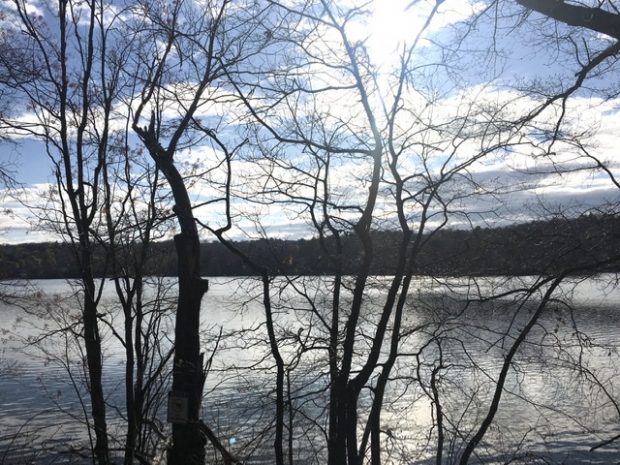Another working day has ended
The Police, “Synchronicity II”
Only the rush hour hell to face
Packed like lemmings into shiny metal boxes
Contestants in a suicidal race
I had a beloved extended family member pass away from COVID-19 this past week, so I’m not really feeling “silver lining” talk with regard to coronavirus. But when you go out for your physically-distanced walk, you may have noticed a bluer sky, a brighter sun. BU’s The Brink has a report on the effects of the stay-at-home order on pollution, echoing the Globe’s report in late March, and what we’ve been seeing with our own eyes: The air is cleaner. And there’s a profound health effect from that.

Air pollution kills people dead, in vast quantities: 200,000 souls a year in the United States. Chronic exposure to air pollution currently is combining with COVID-19 to exact a terrible toll, especially on low-income communities — talk about intersectionality. Since pollution is ambient and pervasive, and not a personalized choice like smoking cigarettes, we tend towards fatalism, feeling that there’s just nothing we can do about it.
Our lack of agency is being proven false: The logical consequence of driving is pollution and death. The logical consequence of ceasing to drive is clean air, clear skies, as we can see. If it’s continued over time, this would result in lives rescued, and vast amounts of money saved:
The City of Boston has set a goal of becoming carbon neutral by 2050, mainly by cutting emissions. But what if Boston eliminated all emissions now?
That is the question asked by a new School of Public Health study published in the journal Environmental Research Letters.
The estimated answer: over 200 deaths avoided in Boston (and the rest of Suffolk County) each year, with reductions in fatal and non-fatal cardiovascular and respiratory illness extending far beyond the city, from Worcester to Barnstable and into southern New Hampshire and northern Rhode Island.
The researchers also estimated that the resulting decrease in medical costs and lost/reduced work could save $1.7 billion in Suffolk County, and $2.4 billion for the entire 75-square-mile zone modeled in the study.
https://www.bu.edu/sph/2020/04/22/a-zero-emissions-boston-could-save-288-lives-and-2-4-billion-annually/
There’s a crack in everything
—Leonard Cohen, “Anthem”*
That’s how the light gets in
If the problem is intersectional, the benefits are likewise intersectional:
Within Suffolk County, we estimate that 47 deaths would be avoided per 100,000 people, around 16% of all-cause premature mortality. We also found a net decrease in cardiovascular and respiratory illness. Across the study domain, these health benefits would be disproportionately conferred upon people of color.
https://iopscience.iop.org/article/10.1088/1748-9326/ab842b
In related news, bike advocate Peter Cheung gets a nice profile in the Christian Science Monitor
“A lot of people have been depressed and sad. But everyone has been saying that when they go out on their bike ride, it just totally makes them feel better, healthier, fresher,” he says. “It’s just been great just to be out on a bicycle. It really, really helps a lot of people to go through these times.”
I can’t tell you how true that is: Biking aerates my brain, my mood. But because it’s not seen as safe, and because of certain comforts and social conventions, bike commuting is still a niche. And yet this ingenious, relatively low-tech device is the cutting edge for a low-pollution future. So I want to normalize the person who shows up to the office cubicle with sweat on their back and bike grease on their pant leg. I want urban space reclaimed from the wide, greedy, and dirty automobile, for walking and biking.
And more elusively but even more consequentially, I want the very air, my lungs and blood and brain, reclaimed from the automobile’s tailpipe. I decline to authorize the automobile’s abuse of my body. (They’ll do it anyway, of course.)
There is no way around it: We are in a vale of sorrow and death. But for the sake of those who survive, we must imagine what it would be like if we decisively, even radically moved away from our deadly, suicidal fossil-based transportation system. We can do this! We have the tools; we just need to be ready to say yes.
*I won’t claim to be a huge fan of late Leonard Cohen, at least not before a few adult beverages. Everybody Knows seems more appropriate to the age:
Everybody knows that the boat is leaking
Everybody knows that the captain lied
Everybody got this broken feeling
Like their father or their dog just died
Everybody talking to their pockets
Everybody wants a box of chocolates
And a long-stem rose
Everybody knows
I am sorry for your loss, Charley.
Thanks. He was a good guy who went through a lot. Maybe more to say later.